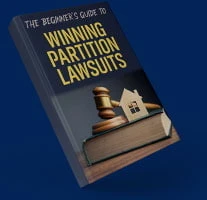The California Partition Law begins at Code of Civil Procedure section 872.010 and ends at Code of Civil Procedure section 874.323. Section 873.210 requires the partition referee to divide the property according to the owners’ interests in the property. This statute is important because it requires the referee to make an equitable division.
Code of Civil Procedure section 873.210 states
The referee appointed by the court to make a division of the property shall divide the property and allot the several portions to the parties, quality and quantity relatively considered, according to their interests in the property as determined in the interlocutory judgment.
(Amended by Stats. 1976, c. 73, p. 110, § 6.)
“Shawn” and “Julie” are an unmarried couple. They decide to buy a home as joint tenants and move in together.
Unfortunately, Shawn and Julie’s relationship doesn’t work out, and they break up. They cannot agree on what to do with the property. Shawn wants to sell the home and move on, so he sues for partition by sale.
The court finds that Shawn and Julie each own a one-half ownership interest in the property. Eventually, the court orders the property to be sold and the sale proceeds distributed. The court appoints a referee to oversee the partition sale. When the property is eventually sold, the referee will divide the remaining sale proceeds in half between Shawn and Julie.
1976 Addition
Section 873.210 continues a portion of former Section 764 with respect to physical division of the property. For provisions relating to sale of the property by the referee, see Chapter 6 (commencing with Section 873.510). See also Section 872.720 (interlocutory judgment).
West’s Ann. Cal. C.C.P. § 873.210, CA CIV PRO § 873.210
Current with Ch. 1 of 2023-24 1st Ex.Sess, and urgency legislation through Ch. 101 of 2023 Reg.Sess. Some statute sections may be more current, see credits for details.
To provide a more comprehensive understanding of Assembly Bill 1671, the Judiciary Assembly Committee issued a report, clarifying its intent regarding the bill. The legislature’s comments are recorded in the Recommendation of the California Law Revision Commission Relating to Partition of Real and Personal Property (January 1975), 13 Cal. L. Revision Comm’n Reports 401 (1975).
The Commission’s consultant for the partition study was Mr. Garrett Elmore, a practicing attorney who was a partition referee and former counsel for the State Bar Committee on the Administration of Justice. While drawing from the recommendations of the California Law Revision Commission, Assembly Bill 1671 aimed to modernize the law governing partition of real and personal property.
The existing title of the Code of Civil Procedure containing the partition remedy was enacted in 1872 and remained largely unchanged. The code had become outdated, with obsolete provisions, procedural gaps, and ambiguities. These shortcomings led to the diminishing effectiveness of the partition remedy. To address these issues, the Commission was tasked to streamline the law, fill in gaps, resolve ambiguities, and modernize the partition remedy.
Overall, the Commission reviewed laws from 1872 and recommended new legislation that superseded previous laws or modified laws. The Commission also repealed several laws and provisions to meet the Commission’s goals of streamlining and modernizing California’s partition laws.
A major change Assembly Bill 1671 made was for owners of successive interests to be given the right to seek partition, though the owners must show that partition is in the best interest of the parties. The Commission also recommended that the parties be able to pick which property interests would be partitioned.
Section 873.210 is an example of a provision that was added. Section 873.210 requires the referee to divide the property according to the owners’ respective interests.
Section 873.210 superseded section 764. Section 764 was a long and confusing provision about how the referee should divide the property. Section 764 stated in relevant part:
“In making partition, the referees must divide the property, and allot the several portions thereof to the respective parties, quality and quantity relatively considered, according to the respective rights of the parties as determined by the court. . .” (Id.)
Commenting on section 764 the Commission stated, in relevant part:
“The portion of former Section 764 that provided for division of the property by the referee in accordance with the rights of the parties is continued in Section 873.210.” (Id.)
The Commission recommended combining the similar aspects of two different provisions to modernize the partition statutes.
In addition, the Commission recommended liberalizing the instances of when a sale of property is permitted as opposed to a physical division. Under the former law enacted in 1872, the partition of property was typically done through physical division. Physical division was required unless such a division would cause significant prejudice. If prejudice would result, then the property could be sold with division of the proceeds. While the Commission did recommend continuing the existing preference for physically partitioning property, it expanded the circumstances where a property sale is allowed. Under Assembly Bill 1671, property can be sold if a sale would be more equitable than a physical division.
The Commission also introduced a third manner of partition, partition by appraisal. This version of partition was introduced for use in situations where physical division is inequitable and partition by sale may have undesired tax liability. Under partition by appraisal, which requires all the parties’ consent, a referee will appraise the property and any party can buy any of the interests in the property at the appraised price.
Ultimately, Assembly Bill 1671 was approved by the Senate Judiciary Committee and is still binding legal authority for the partition of real and personal property.
Here at Underwood Law Firm, our knowledgeable attorneys are here to help navigate the complex web of case law and statutes surrounding partitions. If you are trying to plan a partition order, or just have any questions, please do not hesitate to reach out to our office.
